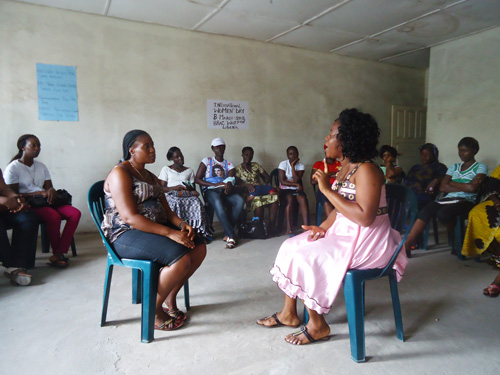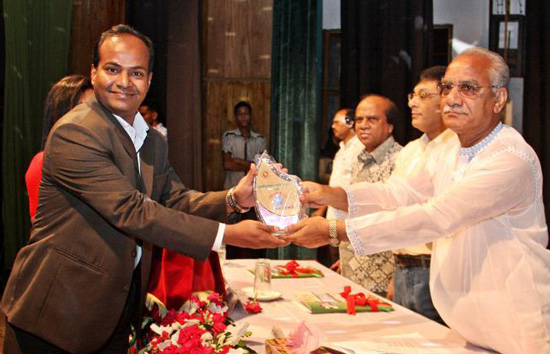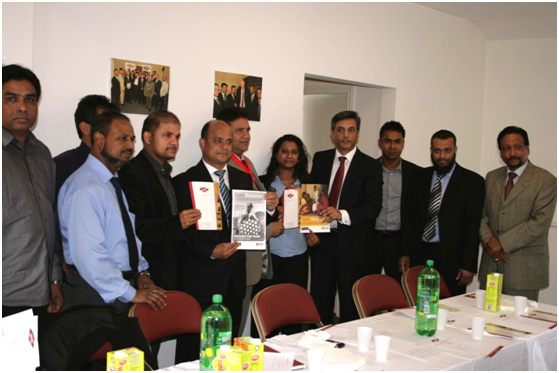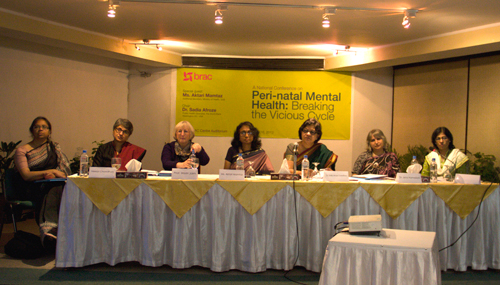
News (826)
Daniel Ng wins BRAC's Innovation Competition
BRAC’s first-ever Facebook competition is officially over! Congratulations to our winner, Daniel Ng from the University of Virginia on his ‘Play’ Project– a community playground project with the objective of creating safe accessible spaces for underprivileged children to play.
“Wow, thank you so much for choosing me! I feel so honored and fortunate and excited to be able to work with such a renowned organization as BRAC,” says Daniel. “I had no expectations of winning since I knew I was competing against very qualified and remarkable people. I still can't believe I won.” Daniel is a freshmen who’s interested in studying Global Development and Statistics.
A special mention goes out to our runners up; Maya – a community empowerment project for women, and Amadeyr Cloud’s digital content delivery project.
In January, we received over 40 submissions from around the world and finally narrowed it down to seven best innovations with potential to be implemented at BRAC. We convened several internal judging panels to make our final decision. The winner gets the unique opportunity to work with BRAC’s Social Innovation Lab in Bangladesh. We thank all our participants for their submissions and look forward to organizing similar projects in the future.
“This was our first attempt to organize a Facebook contest and the response was great! The quality of the submissions we received was very impressive,” stated Mr. Asif Saleh, BRAC’s Director of Communications and the Social Innovation Lab. “We look forward to having similar events in the future to not only foster innovation, but get people thinking more seriously about some of the social problems we face today.”
BRAC gears up to assist Sierra Leone as the country encounters the worst cholera outbreak in the last 15 years
04 September 2012, Dhaka. On Thursday, 16 August, the government of Sierra Leone declared the cholera outbreak a national humanitarian emergency. A presidential taskforce was established shortly after the declaration. As of 24 September, Sierra Leone has recorded over 14,000 cases and 240 deaths in 10 out of 13 districts.
BRAC has taken up various measures to ensure full assistance to the affected and distraught in Sierra Leone. In collaboration with the country's district health management teams (DHMT), we are providing the necessary support to disseminate cholera prevention messages through our network of 660 community health promoters (CHP) and 33 programme assistants in the Western area, Port Loko, Bombali, Tonkolili, Bo, Kenema, and Kono districts.
We are providing approximately SLL 43 million (USD 10,000) as cash grant for immediate emergency support and mobilising our human resources to provide the DHMTs with the following services:
- Promoting and distributing oral rehydration solution (ORS) aqua tabs and disinfectants through the CHPs
- Arranging regular health meetings in communities to influence behavioural change
- Providing refreshers training on cholera preparedness to the CHPs who are assisting to disseminate cholera prevention messages
- Providing DHMTs with necessary tools and supplies such as, IV ringers lactate, ORS, Doxacycline capsules, zinc and disinfectants
The DHMTs have requested for further assistance from BRAC in raising community awareness in distant chiefdoms to ensure a greater coverage.
"In this critical time, we remain committed to doing our best to help the government of Sierra Leone contain the epidemic by mobilising both human and additional financial resources, and using our knowledge in dealing with communicable diseases through a community-based approach," said Faruque Ahmed, Senior Director of BRAC International.
BRAC started its operation in Sierra Leone in 2008, and has reached over 700,000 Sierra Leoneans with activities in microfinance, agriculture, livestock, poultry, health and legal services. We are a global leader in creating large-scale opportunities for the poor, touching the lives of an estimated 126 million people – a global movement bringing change to 10 countries in Asia, Africa and the Caribbean.
Help us address the humanitarian emergency in Sierra Leone by making a donation at http://www.brac.net/donations/view
Lessons Learned Sharing Session on “Social Mobilization and Accountable Local Governance towards Creating MDG Unions”
01 September 2012, Dhaka. A Lessons Learned Sharing Session on “Social Mobilization and Accountable Local Governance towards Creating MDG Unions” – a joint initiative of BRAC Community Empowerment Programme and The Hunger Project-Bangladesh, was held on Wednesday, 29th August 2012 at VIP Lounge, National Press Club, Dhaka.
Dr. Akbar Ali Khan, former Adviser of the Caretaker Government was the Chief Guest at the session. We were also honored to have Ms. Shaheen Anam, Executive Director, Manusher Jonno Foundation and Mr. Hasan Mazumdar, Country Representative, The Asia Foundation, as Special Guests, and Dr. Tofail Ahmed, Adviser, Local Governance, UNDP, Professor Salahuddin M Aminuzzaman, Ph.D, Department of Public Administration, University of Dhaka, and Ms. Shanaz Arefin, National Coordinator, Local Governance Project, SHARIQUE as Guest Speakers. Dr. Badiul Alam Majumdar, Global Vice President and Country Director, The Hunger Project-Bangladesh presented the keynote paper of the programme, while the session was inaugurated by Ms. Anna Minj, Director, Community Empowerment Programme and Integrated Development Programme, BRAC. The session was chaired by Dr. Mahabub Hossain, Executive Director, BRAC. Present at the occasion were nearly 200 participants, including Union Parishad representatives, project beneficiaries, representatives from government-nongovernment organizations, policy makers, journalists, and members of the civil society.
External evaluation of BRAC West Africa Health programmes
26 August 2012, London.

Community health promoters doing role play at a refreshers training for malaria prevention at a BRAC branch in Paynesville, Monrovia, Liberia.
BRAC UK recently commissioned and facilitated an external evaluation of BRAC Liberia and BRAC Sierra Leone’s health programmes.
Since starting the programme in late 2008, BRAC has established a combined network of nearly 1,300 community health volunteers and staff in both countries delivering essential health care services in five key areas: reproductive healthcare;
Malaria control; TB control; family planning; and basic curative services.
The programme reaches a population of more than half a million people in Liberia (20 districts) and close to 800,000 people in Sierra Leone (7 districts).
Independent consultant, Sybil Bailor, who conducted the evaluation, ensured that all stakeholders were involved in the process including key partners in government and civil society, and local leaders and community participants. In the executive summary, she wrote:
“BRAC is seen as a valued partner in health in Liberia and Sierra Leone. The essential healthcare model implemented by BRAC is unique in the way it actually delivers practical and real health care in the community based on tried and tested methods improved over many years in Bangladesh and other parts of the world where poverty, war, and conflict have completely eroded the formal health system.”
The report made recommendations for including: the need for a simpler referral system to community health volunteers and increase uptake of government services; the opportunity for more malaria and tuberculosis treatment as part of the community healthcare approach; and the need for a publicity strategy to raise awareness of BRAC’s work in health, agriculture and livelihoods.
For a copy of the report, please email This email address is being protected from spambots. You need JavaScript enabled to view it.
PACE supported approaches - one of the top ten innovations
25 July 2012, Dhaka. Post-primary basic and continuing education (PACE), a unit of BRAC
Education Programme, took part in the competition “Innovative Secondary Education for Skills Enhancement (ISESE)” organised by R4D (Results for Development), with support from the Rockefeller Foundation. PACE supported approaches have been profiled as one of the top ten innovations in this competition. The title of BRAC’s submission is ‘Joyful Learning in Non-Government Secondary Schools in Bangladesh: Public Private Partnership’.
The R4D education team launched the Ashoka Changemakers Competition to identify innovative models of skills delivery at the secondary school level. The competition was meant to draw out promising innovations, new ideas, and entrepreneurial models that enhance learning of secondary school students in both the public and the non-state sectors. The competition is part of R4D’s broader Innovative Secondary Education for Skills Enhancement project, funded by the Rockefeller Foundation.
BRAC Fisheries Awarded at the National Fisheries Fair 2012

21 July 2012, Dhaka. BRAC Fisheries has been awarded for its outstanding achievement over the years in empowering the fisheries sectors by the Department of Fisheries (DoF) under Ministry of Fisheries and Livestock, Bangladesh at the National Fisheries Fair 2012. The Fisheries Fair was held at the Ramna Park, Dhaka, from 8:00 - 12:00 p.m. on July 13, 2012.
BRAC began its fisheries programme in 1976 for giving extension support to beneficiaries. Later as a response to country-wide demand from commercial fish farmers as wild stocks continued to decline, the programme evolved into BRAC Fisheries and was established as an enterprise in 1998. Today, the fisheries enterprise operates seven prawn hatcheries, three carp hatcheries, three tilapia hatcheries, two parent stock improvement centres and one fish farm. The reach of the enterprise includes around 250 upazilas in 55 districts of Bangladesh through Sales Officers and dealers who provide fish spawn, prawn post larvae, tilapia fry and fingerlings/juveniles to the fish farmers.
The Guild of Bangladeshi Restaurateurs donates generously towards the Vision Bangladesh Project
19 July 2012, London. A cheque hand-in ceremony was held by the Guild of Bangladeshi Restaurateurs on 18 July 2012 in Birmingham, where £1350 was donated towards the Vision Bangladesh project to eradicate cataract blindness within the Sylhet division by 2013. The event was attended by Walsall’s Deputy Mayor Mohammed Nazir, the Executive Committee of the Staffordshire region and prominent local business leaders.

Pictured (from left to right) Dilu Mia, Abdul Gafur, Farooq Uddin, Abdul Shahid, Mohammed Nazir (Deputy Mayor of Walsall), Tanha Habib (BRAC UK), Imam Uddin (President of the Guild of Bangladesh Restaurateurs), Sadiq Miah, Suruk Miah and Mostaffa Juboraj.
Deputy Mayor Mohammed Nazir expressed his appreciation for the “brilliant work” that BRAC is doing to alleviate cataract blindness in Sylhet Division. This was echoed by Imam Uddin, President of the guild, Staffordshire region:
“It gives me great pleasure in commending BRAC for their commitment and efforts in helping disadvantaged people around the world in restoring their affected sight.”
Mr. Imam Uddin also commended the innovative idea of adding a voluntary donation as part of the ‘£1 on the Bill’ campaign, enabling customers to join in the fun of fundraising for a good cause. The guild was pleased to find that many customers donated more than £1 once they were told of the benefits of their donation.
Cataract blindness is very common in Bangladesh, with 80% of cases being preventable and curable. Due to a lack of health resources and financial constraints a majority of these patients, many of whom are from impoverished backgrounds, cannot afford to have their sight restored. This is where Vision Bangladesh, a joint venture between BRAC and Sightsavers, is making a massive difference.
Policy intervention for addressing maternal depression will eventually lead to a better nation

16 July 2012, Dhaka. BRAC has organized a national conference on “Peri-natal Mental Health: Breaking the Vicious Cycle” at BRAC Centre Auditorium on Monday, July 16, 2012. Ms. Akhtari Mamtaz, Additional Secretary, Ministry of Health, Government of the People’s Republic of Bangladesh was present as a Special Guest. The conference was based on a research that rendered first of its kind findings in Bangladesh on strong associations between peri-natal mental health and underweight babies, infant mortality and stunting – conditions that may lead to other major health problems even in adulthood. Ms. Mamtaz said: “The Government of Bangladesh is working on improving maternal and child health in Bangladesh through the Director General of Health Services and Directorate of Family Planning. Unfortunately, we have not been able to address the peri-natal mental health issue specifically. With the help of NGOs, International organizations and various other stakeholders, we should be able to improve the maternal depression situation of Bangladesh for the interest of a better nation” .
Dr. Hashima-E-Nasreen, BRAC, Dr. Maigun Edhborg, Senior Lecturer and Dr. Zarina Nahar Kabir, Associate Professor, Karolinska Institutet, Sweden, and Dr. Jena Hamadani, Scientist, ICDDR,B presented papers on maternal depression and its relation to intimate partner violence and its impact on mother-infant bonding and child development. In the keynote paper, Dr. Neerja Chowdhury, Consultant Psychiatrist, London School of Hygiene and Tropical Medicine, UK and Sangath , India highlighted the public health importance of maternal depression. She mentioned in her presentation -“The high prevalence of peri-natal depression has consequences – it can increase mortality in women through suicide, it can have a negative impact on child growth, and it can have even other health implications. So, in fact, if we are treating maternal depression, we are not just improving maternal mental health, we are improving child growth with having these other benefits too”.
Dr. Sadia Afroze Chowdhury, Public Health Specialist, the World Bank, Washington DC, USA has chaired the conference. In her concluding remark, Ms. Chowdhury stated “we have learned the reasons and the long lasting impact of maternal depression throughout the presentations, and now it’s time to take policy initiatives to improve the overall situation”. This conference has provided a platform for researchers, practitioners and policy makers to share knowledge and ideas on improving and mainstreaming peri-natal mental health in public health.
Landmark target reached for Vision Bangladesh in Sylhet
 12 July 2012, London. Dr. Mahabub Hossain, Executive Director of BRAC, has attended a number of high profile events in London this week to highlight the success of Vision Bangladesh and launch a Ramadan advertising campaign with four Bangla TV stations to help raise donations. Vision Bangladesh is an innovative large-scale partnership programme between BRAC and Sightsavers, with the target of eliminating cataract blindness in Sylhet Division by December 2013 and across the whole of Bangladesh by 2020. By the end of June 2012, the programme was well ahead of schedule with 526,000 people screened and 61,000 sight restoring operations performed in Sylhet. During Ramadan alone, Vision Bangladesh will be identifying and treating 2,500 cataract cases.
12 July 2012, London. Dr. Mahabub Hossain, Executive Director of BRAC, has attended a number of high profile events in London this week to highlight the success of Vision Bangladesh and launch a Ramadan advertising campaign with four Bangla TV stations to help raise donations. Vision Bangladesh is an innovative large-scale partnership programme between BRAC and Sightsavers, with the target of eliminating cataract blindness in Sylhet Division by December 2013 and across the whole of Bangladesh by 2020. By the end of June 2012, the programme was well ahead of schedule with 526,000 people screened and 61,000 sight restoring operations performed in Sylhet. During Ramadan alone, Vision Bangladesh will be identifying and treating 2,500 cataract cases.
Dr. Mahabub Hossain stresses on how public support continues to be critical:
“We know the British Bangladesh communities have been very generous in the past to Vision Bangladesh and donated through public appeals and online. We would like to thank those people and also encourage more people to donate – we still need to raise funds to complete 39,000 operations. Help us help those who are blind – just £20 can give the gift of sight and change a person’s life forever.”
Dr. Hossain was also the guest of honour at a VIP event for Vision Bangladesh, held at the Churchill Room at the Palace of Westminster on Wednesday 11 July 2012, hosted by Nicky Morgan, MP - a staunch supporter of Vision Bangladesh who visited the programme through the Conservative Party’s Social Action Project in 2011. There was a large turnout from leaders of the British Bangladesh business community; many of whom made pledges to support the programme.
Inauguration of Ideal Ward 2012 - A Joint Initiative of Local Government, BRAC, and Community
10 July 2012, Dhaka. On 7th July, 2012, at 11:00 am, Boragari Union Parishad, BRAC Community Empowerment Programme and community organisation – Polli Shomaj, jointly inaugurated the 6 no ward of Boragari Union, Domar, Niphamari, as Ideal Ward. The inauguration ceremony was held at the field of Dolapara government Primary School, Boragari.
Advocate Momtazul Haq, Administrator, District Parishad, Nilphamari was present as the Chief Guest with special guests Anna Minj, Director, Community Empowerment Programme and Integrated Development Programme, BRAC; Mr. Abdur Razzak Boshuani, Upazila Chairman, Domar; and Mr. Md. Nazmul Huda, Upazila Nirbahi Officer, Domar. The ceremony was chaired by Mr. Isahaq Ali, Chairman, Boragari Union Parishad. Participants from various government and non-government organisations, members of the civil society, representatives from the Polli Shomaj and around 4,000 participants from the wider community were also present at the occasion.
Polli Shomaj is a ward level community organisation of the poor and marginalised, especially women, facilitated by BRAC Community Empowerment Programme. With focus on women’s empowerment, Polli Shomaj has been engaged in various social development activities for a long time. During its course of action over a period of time, experience of Polli Shomaj indicated that it is essential to work with all spheres of the society to achieve community development in light of the Millennium Development Goals. In this regard, in 2011, Polli Shomaj, local Union Parishad, and BRAC Community Empowerment Programme jointly started mobilising the community towards social development for transforming the 6 no ward of Boragari Union, Domar, Niphamari, as an Ideal Ward. Through collaboration with people at the grassroots level, the community worked towards creating an Ideal Ward with development in education, health, environment, water, sanitation, and to combat human rights violations, especially violence against women. Working in unity, the community and local government has made this Ideal Ward a place where school enrollment of children is 100%, while 100% people have access to sanitary latrines and tubewells. Also, illegal activities - such as child marriage, teasing (sexual harassment), violence against women, and gambling have stopped in the ward. The community members are now easily accessing resources and services from the local government, while 100% people have completed birth and death registration. Infrastructure and environment development are also reflected through 7 km of road improvements and 8 km of social forestry. Currently, there is also a MBBS doctor available for providing health care at the ward. With focus on the Millennium Development Goals, this 6 no ward of Boragari Union was transformed into an Ideal Ward through the active participation of the community people.
Join the world’s biggest family




